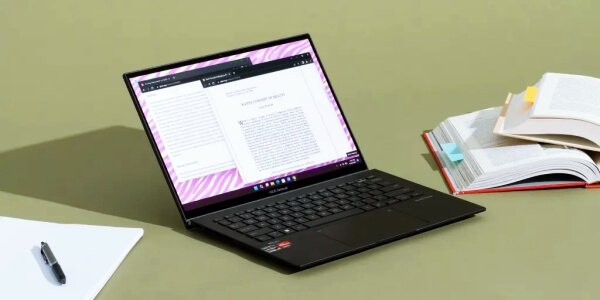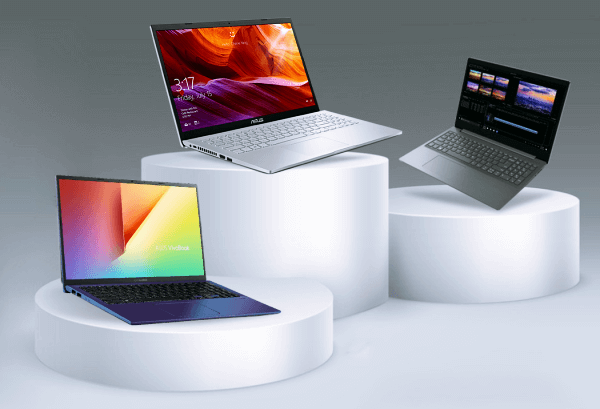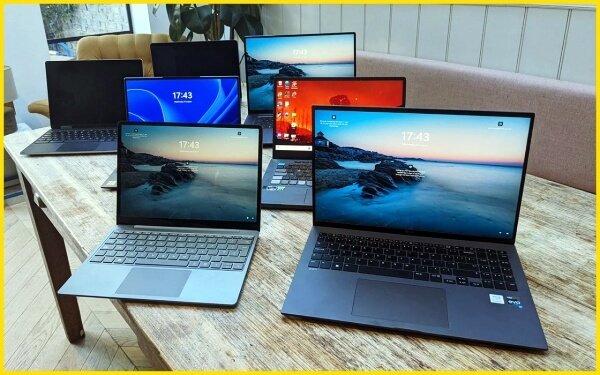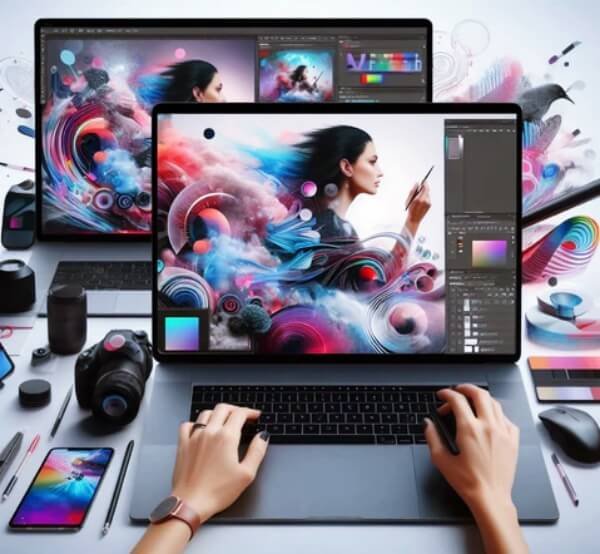College is a wonderful journey full of education and new experiences. This blog post will reveal the finest laptops for students on a budget, allowing you to select the ideal computer to ace your studies without breaking the bank.

What Is A Laptop?
A laptop, often called a notebook computer, is a type of personal computer that is portable. Here’s an overview of its main features:
- Portability: Unlike desktop computers, laptops are meant to be moved and used in a variety of settings. They are often smaller and lighter, with built-in batteries that enable wireless operation.
- All-in-One Design: Laptops combine the majority of a desktop computer’s components – a display screen, keyboard, touchpad (or pointing stick), processor, memory, and storage – into one unit. This eliminates the need for separate peripherals such as a monitor, mouse, and keyboard, making it perfect for portable use.
- Laptops can do the majority of the same things as desktop computers, including browsing the internet, running productivity applications (such as word processors and spreadsheets), watching videos, playing games, and so on.
- Battery Life: Battery life is an important element of laptops. Modern laptops can often run for several hours on a single charge, allowing for extended use without the need to plug in.
- Laptops come in a variety of sizes, specs, and features. They can be tiny and light for easy travel, or more powerful with larger screens for video editing or gaming.
- Laptops are a flexible computing tool that has become an indispensable element of modern life, particularly for students, professionals, and anyone who needs a computer that can be used on the road.
Related: Budgeting Bootcamp: From Zero To Hero In 5 Easy Steps

The Importance Of A Laptop
In today’s digital world, a laptop has numerous benefits that can greatly improve many parts of your life, especially for students. Here’s a closer look at the significance of laptops:
Education and Learning:
- Enhanced Learning: Laptops provide access to a vast amount of educational resources online, from e-books and research papers to educational websites and interactive learning platforms.
- Improved Organization: Students can efficiently manage their studies with note-taking apps, project collaboration tools, and digital calendars, keeping everything organized and accessible.
- Research Powerhouse: Research projects become a breeze with a laptop. Students can access scholarly articles, online databases, and academic websites for in-depth research.
- Communication and Collaboration: Laptops enable easy communication with professors and classmates through email, video conferencing, and online discussion forums, fostering collaboration and knowledge sharing.
Productivity and Work:
- Multitasking Master: Laptops allow you to seamlessly switch between tasks, juggling assignments, web browsing, presentations, and more, making you a productivity powerhouse.
- Work on the Go: The portability of laptops allows you to work from anywhere, whether it’s at the library, a coffee shop, or even during your commute.
- Software Savvy: Laptops come equipped with essential productivity software like word processing, spreadsheets, and presentation tools, enabling you to create professional documents, presentations, and reports.
- Remote Work Opportunities: Laptops open doors to remote work opportunities, offering flexibility and the ability to earn an income while managing your studies.
Entertainment and Connectivity:
- Stay Connected: Laptops keep you connected with friends and family through social media, video calls, and instant messaging, bridging geographical distances.
- Entertainment Hub: Stream your favorite movies and shows, listen to music, or play games – laptops provide a versatile entertainment center to unwind after a long day of studying.
- Creative Outlet: For the artistically inclined, laptops can be used for graphic design, music production, video editing, and other creative pursuits.
- Global Access: With an internet connection, laptops become a window to the world, allowing you to explore different cultures, access international news, and connect with people from all over the globe.
Owning a laptop is not just about having a computer; it’s about having a powerful tool that can empower your learning, fuel your productivity, and keep you connected in an increasingly digital world. Especially for students, a laptop is an investment in their academic success and overall well-being.
Related: Starting Your Investment Journey Without Feeling Overwhelmed

How To Choose A Laptop As A Student
Having the proper laptop will help you navigate the opportunities and pitfalls of college life. You will know how to choose a laptop that fits your budget, lifestyle, and academic requirements.
Establishing the Goal of Your Laptop
Think about how you’ll be using your laptop for a moment before examining features and specs:
- Coursework and Research: How much time will you spend writing essays, making notes, and searching the internet? Or will you require a computer capable of running computationally intensive software for data analysis, design, or engineering?
- Entertainment: Do you intend to play video editing software, stream movies, or play games on your laptop? These tasks call for more potent graphics capabilities.
- How crucial is it that your laptop be portable and convenient to tote from class to class?
- Battery Life: If you want to use your laptop all day without access to an outlet, a long battery life is crucial.
Related: Negotiation Nation: Mastering the Art of Getting What You Deserve

Crucial Features Of Laptops For Students
- Processor (CPU): Your laptop’s CPU is its brain, handling information processing. An AMD Ryzen 3 or Intel Core i3 CPU is adequate for daily work like word processing and web browsing. A Core i5/Ryzen 5 processor or above is needed for more demanding apps like gaming and video editing.
- Consider RAM (Random Access Memory) as the temporary memory on your laptop. For most students, 8GB of RAM is a fine starting point, but 16GB is advised if you plan to multitask or run memory-intensive applications.
- Storage: This is the area where you keep your programs, data, and papers. The cost and speed of a 256GB solid-state drive (SSD) are nicely balanced. A combination of an SSD and a conventional hard drive (HDD) can provide additional storage capacity if you intend to store huge items, such as movies or games.
- Battery Life: If you want to be sure you can stay working all day, look for a laptop that can run on a single charge for at least eight hours.
- Operating System: The two main choices are Windows and macOS. Windows offers greater flexibility and affordability, while macOS is known for its user-friendliness and seamless integration with other Apple devices.
Pro-Tips for Extending Your Laptop’s Lifespan:
- Invest in a protective case: Safeguard your investment from bumps and scratches.
- Practice good battery care: Avoid extreme temperatures and draining the battery completely.
- Regular cleaning: Keep your laptop dust-free to prevent overheating.
- Software updates: Install the latest updates to maintain security and optimal performance.
Related: Study Medicine Abroad In 2024

Best Budget Laptops For Students
Top Picks for Budget-Friendly College Laptops (Under $800):
- Acer Aspire 5 (2024): This versatile laptop boasts an AMD Ryzen 5 processor, 8GB of RAM, and a 256GB SSD, making it a well-rounded option for everyday tasks and basic productivity applications. Its sleek design and long battery life make it an attractive choice for students on the move. Expect to pay around $500.
- Lenovo IdeaPad Flex 3 Chromebook: If you’re a cloud-based warrior, a Chromebook like the Lenovo IdeaPad Flex 3 is a fantastic budget option. Chromebooks run on Chrome OS, offering a fast and secure experience with access to web-based applications and Android apps. This convertible Chromebook boasts a long battery life and a flexible design that allows you to switch between laptop and tablet mode for presentations or note-taking. Prices typically start around $350.
- HP Pavilion Aero 13: This lightweight powerhouse packs a punch with an AMD Ryzen 5 processor, 8GB of RAM, and a 512GB SSD. While edging slightly above the $800 mark at around $880, it offers exceptional value for students who need a capable machine for multitasking, content creation, and entertainment.
Top Picks for Premium Budget Laptops (Under $1200):
- Dell XPS 13 (2024): Renowned for its sleek design, stunning display, and long battery life, the Dell XPS 13 is a premium choice for students who prioritize aesthetics and performance. Starting around $950, it offers various configurations with Intel Core i5 or i7 processors, 8GB to 16GB of RAM, and 256GB to 1TB SSD storage.
- Apple MacBook Air M2: MacBooks are popular for their user-friendly macOS operating system and seamless integration with other Apple devices. While typically more expensive, the MacBook Air M2 offers impressive performance with its Apple M2 chip, 8GB of RAM, and 256GB of SSD storage. Expect to pay around $750 for the base model, but remember that MacBooks often retain their value well if you ever decide to resell them.
The “best” laptop depends on your individual needs and budget. Consider your typical tasks, desired portability, and preferred operating system when making your choice.
Related: Building Rapport In Interview With Your Potential Employer

The Drawbacks Of Owning A Laptop
While there are many advantages to laptops for students, there are also some drawbacks to take into account before clicking “purchase”:
Health Issues:
- Posture problems and eye strain: Prolonged computer staring can cause migraines, neck and back pain, and eye strain. To reduce these hazards, it’s essential to take breaks, change the brightness of your screen, and adopt excellent posture.
- Increased Blue Light Exposure: Blue light from laptops can interfere with sleep cycles and lower the quality of sleep in general. To lessen blue light emission at night, think about utilizing blue light filters or changing the settings on your screen.
- Distractions and Productivity: Multitasking Mayhem: Laptops provide an endless stream of distractions, from social media notifications to email alerts and browsing opportunities. This may impair your capacity to concentrate on schoolwork and assignments. Implementing self-discipline measures such as time management and website filters can be beneficial.
- Portability Paradox: While portability is a significant advantage, it can lead to you continuously checking your laptop, even while you’re not using it. This can blur the distinction between work and personal life, limiting your ability to completely detach and decompress.
Security and maintenance:
- Laptops are vulnerable to viruses, malware, and cyberattacks. Make sure you have effective antivirus software installed and that your operating system is up-to-date with the latest security patches.
- Potential for Theft: Laptops are portable and desirable to thieves. Be mindful of your surroundings when using your laptop in public places, and consider theft protection measures like registration or cable locks.
- Battery Degradation: Over time, all batteries lose their capacity. Taking proper care of your laptop battery can extend its lifespan, but eventually, you might need to replace it, adding to the overall cost of ownership.
Cost Considerations:
- Initial Investment: Even budget-friendly laptops require an upfront financial investment. Compare features, specifications, and brand reputation before making a purchase.
- Possibility of Upgrades: Unlike desktop computers, laptops may not be as easily upgraded. Think about whether the base model you select will provide you with enough power for all of your needs during your time in college.
Related: Fake It Till You Make It: The Truth About Your Authentic Self

Desktop vs. Laptop: Which Is Better For Students?
There is no one-size-fits-all solution when it comes to students’ desktop and laptop decisions. Depending on your budget, priorities, and unique needs. To assist you in making an informed choice, the benefits and drawbacks of each option are broken down here:
Laptops:
Pros:
- Portability: Because laptops are small and lightweight, you may work from any place, including the great outdoors (weather permitting), coffee shops, libraries, and dorm rooms. This flexibility is perfect for students who have demanding schedules or who like to collaborate in different environments.
- Convenience: Laptops are self-contained units, that integrate the monitor, keyboard, and touchpad into a single device. This eliminates the need for extra peripherals and makes them easier to set up and use.
- Battery Life: Modern laptops offer decent battery life, allowing you to work for several hours on a single charge. This is crucial for students who are on the go and don’t always have access to an outlet.
Cons:
- Lower Performance (Generally): For the same price point, desktops typically offer more powerful processors, graphics cards, and larger RAM capacities compared to laptops. This can be a disadvantage for students who need to run demanding software like video editing programs or complex simulations.
- Ergonomics: Due to their design, laptops can cause bad posture and discomfort when used for long periods of time. Purchasing an external monitor, keyboard, and mouse can improve ergonomics but limit portability.
- Higher Cost (Per Performance): Laptops are typically more expensive than desktops of comparable performance. This is due to the demand for downsizing and portability in laptops.
Desktops:
Pros:
- Superior Performance: In general, desktops provide more processing power, better graphics cards, and more RAM for your money than laptops. This makes them perfect for students studying engineering, design, or data analysis, which all demand resource-intensive software.
- Upgradeability: Desktop computers are often easier and less expensive to upgrade than laptops. As your requirements change, you can add additional RAM, replace the graphics card, or expand your storage space. This extends the life of your computer.
- Desktops provide a more ergonomic arrangement, which includes an external display, keyboard, and mouse. This can help avoid neck and back pain, particularly during prolonged study sessions.
Cons:
- Desktop computers are immovable and are not intended to be readily moved about. This can be troublesome for pupils who have to work in multiple locations.
- More Space Required: Desktops take up more space than laptops, which can be a concern for students living in cramped dorm rooms or apartments.
- Multiple Components: Desktops require multiple components – a CPU tower, monitor, keyboard, mouse, etc.—which can be more cumbersome to set up and manage compared to an all-in-one laptop.
Here are some additional factors to consider:
- Your Coursework: If your studies involve demanding software or multitasking, a desktop might be a better choice.
- Your Budget: Laptops are more portable, but they cost more than desktops with comparable performance.
- Your Lifestyle: If you value mobility and convenience, a laptop might be a better fit. If you value raw power and upgradeability, a desktop computer may be the best option.
Related: Frugal Living Hacks: Cutting Costs Without Sacrificing Quality
Conclusion
A laptop is a crucial instrument for academic success. By prioritizing your needs, examining these top options, and using helpful buying advice, you’ll be well on your way to selecting the ideal laptop that feeds your academic adventure without breaking the bank. Remember, the greatest laptop is one that meets your individual needs and encourages you to achieve your college goals!
Look for student discounts at electronics stores, educational institutions, and manufacturers. These can significantly reduce the cost of your laptop purchase. Best of Luck!

